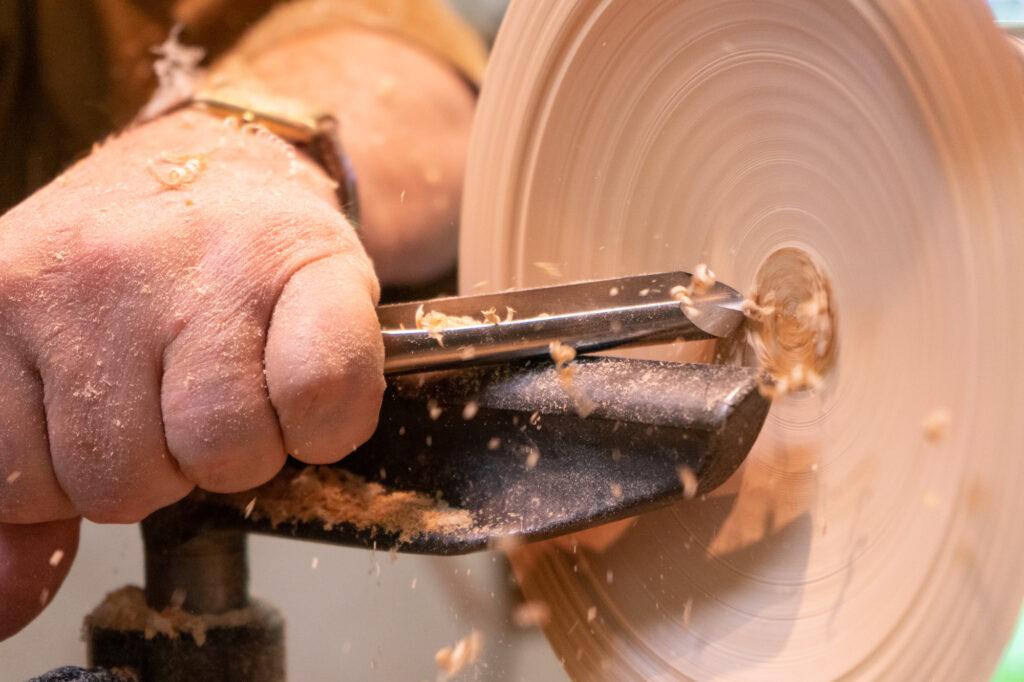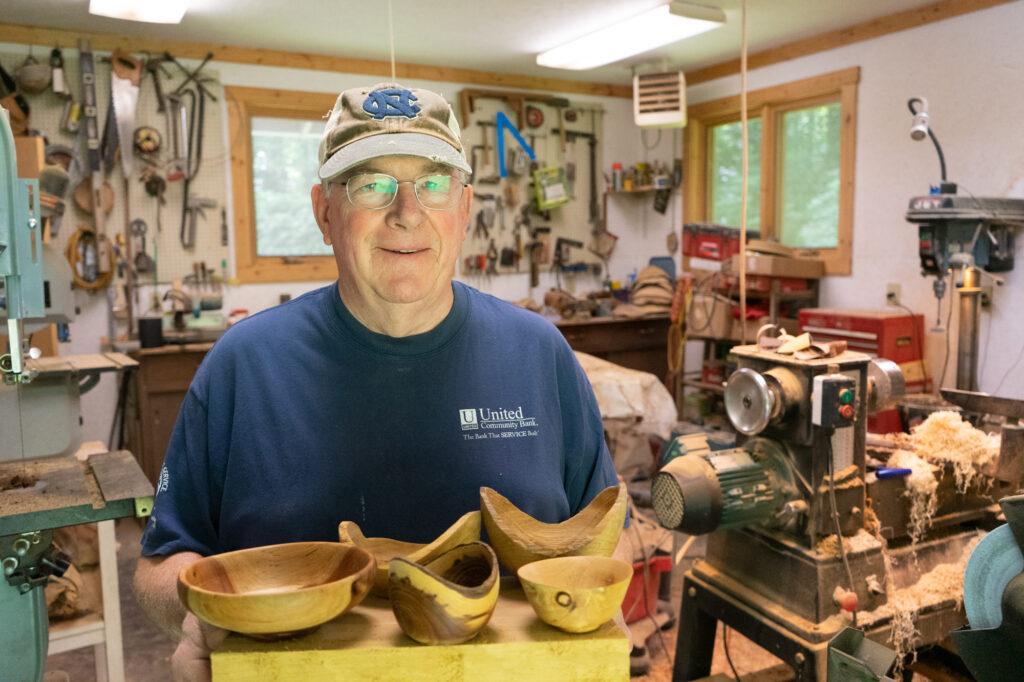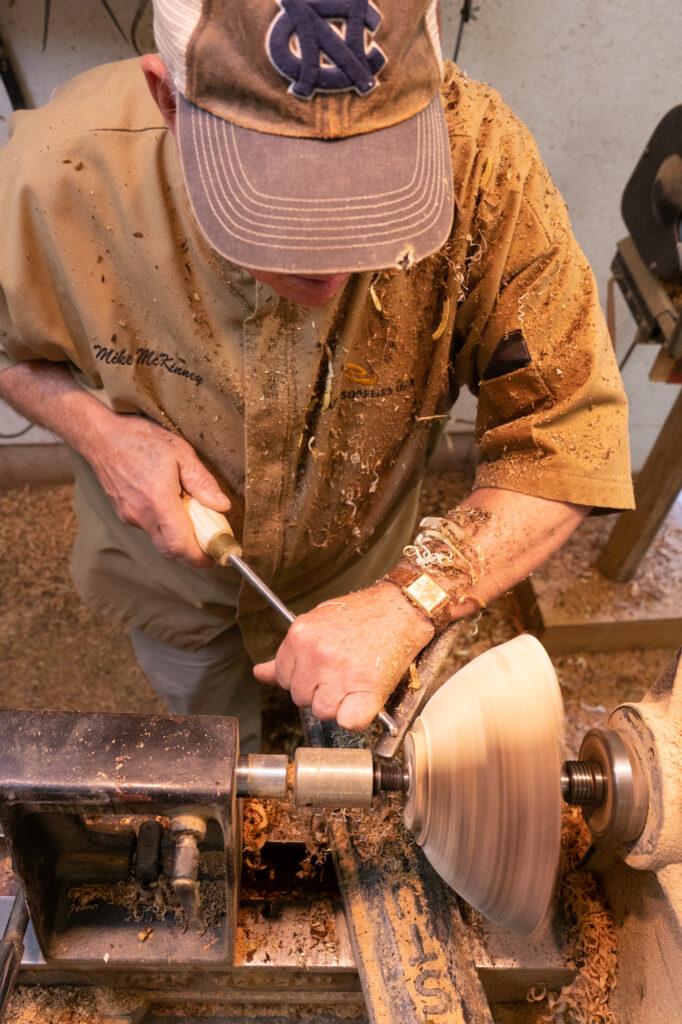Bowls in various stages of production scattered the workshop around Mike McKinney, piled onto tables and shelves besides a host of different woodworking equipment. At the center of it all sat the lathe, illuminated by studio lights and backed by a wall of hanging tools. Behind the lathe, Mike prepared his next piece for turning, answering questions about his craft with quiet-but-clear passion.
Shavings leapt into the crook of Mike’s arms as he guided his tool into the spinning wood. His face rested in a look of calm concentration, only broken to comment on the material or explain his actions. Moments before, the piece in front of him had been nothing more than a section of a walnut tree, but with each spin it further resembled a bowl, richly dark with sections of crème running through.

Mike lives and crafts in Maggie Valley. He makes natural-edge and utility bowls, as well as a range of other turned products. He retired as City President from the Waynesville branch of United Community Bank in September 2019. He has pursued woodturning since 1993, but has been around crafting far longer.
Born in 1953 into a family with three generations of woodworkers behind him, Mike was raised to be familiar to with the crafts of WNC. Mike grew up in Spruce Pine, where he helped his father, David McKinney, a furniture maker, and his grandfather Paul McKinney, a carpenter, in the workshop. His great-grandfather Mose McKinney worked with wood, as well.
Mike said his father was “just a mountain man that loved to see people create.” He recalled that his father took him to the Southern Highlands Craft Guild’s annual fair in Asheville and their gallery at Moses Cone Manor in Blowing Rock.

Mike, however, only discovered his passion for woodworking as an adult. He was working for First Union National Bank as a city executive for Murphy, Andrews, Hayesville when his father invited him on a trip to see Lissi Oland, a woodturner in Brasstown, NC. Lissi made “really rustic vessels,” Mike said, and watching her work inspired him to take up her craft.
After their visit to Lissi’s, Mike asked, “Daddy, what would it take to get started? 500 dollars?” His father doubted that it would be that cheap. To Mike’s great fortune, he found somebody in the Iwanna paper selling a lathe and tools cheaply—“maybe 150 dollars,” he said,—and he started turning in 1993. It was a modest setup and his wife, Vanessa, asked what he planned to do with the tools. Mike responded, “Maybe I will make some shavings.”
Mike tells people the lathe is “mesmerizing,” like staring into a campfire. He said, “You can have a lot of fun, as I did, just making shavings.” From there you just can’t wait to make something else. Indeed, after a couple of weeks, Mike turned his first bowl.
He began to attend clubs and seminars, really trying to dive into the hobby. He wanted to go full-time, Mike said, but he had a daughter going to college and another close behind her. He “kept turning, kept banking,” Mike said, supporting his family and pursuing his craft.

However, when Mike moved to Waynesville to work at United Community Bank, he put the hobby aside for a while. It wasn’t until the particularly chilly winter of 2006, Mike said, that he began to turn again. “I found out how much I really missed turning,” he said and has turned regularly since then.
After retiring, Mike now pursues woodturning as much as he likes. He described turning as the “only hobby I’ve had that pays its own way, not immediate or quick, but it’s true.”
Mike is involved with the Haywood Arts Council, Carolina Mountain Woodturners and American Association of Woodturners. He said he has benefited tremendously from the clubs he’s been a part of, learning that there is “not an exact right way to do anything. Sometimes it’s just good to know you’re not doing it wrong.”
Mike says WNC is a pretty crafty community, with “lots of opportunities to find someone to talk to and commiserate with.” These last few months, however, COVID-19 has kept him at home more than usual. On the bright side, he remarked, he has had a lot of time in the shop. All that time has led him artistically to places he wouldn’t have gone if he hadn’t been spending time in the workshop, he said.
Mike said the pandemic has slowed sales, but he has been able to build up a backlog of work that he soon hopes to sell soon. He plans on having an online presence, but in the meantime his work can be found at Cedar Hill Studio and Gallery, the Haywood County Arts Council Gallery and Gifts and the Red Wolf Gallery in Brevard. With a laugh, he also invited folk to shop off his dining room table.
